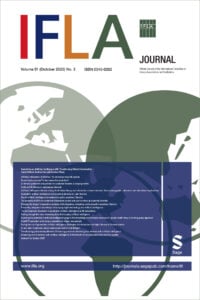Out Now: October 2025 issue of IFLA Journal – Special Issue on Artificial Intelligence (AI): Transforming Global Librarianship
26 September 2025

IFLA Journal is an international journal publishing peer reviewed articles on library and information services and the social, political and economic issues that impact access to information through libraries.
The Journal publishes research, case studies and essays that reflect the broad spectrum of the profession internationally.
IFLA Journal Volume 51, No.3 (October 2025)
This special issue of IFLA Journal is dedicated to the theme “Artificial Intelligence: Transforming Global Librarianship”. Bringing together 18 original contributions from around the world, the issue examines how AI is reshaping library services, information literacy, policy, and professional practice across diverse contexts. Articles range from studies of AI literacy among students in South Asia, Latin America, and China, to explorations of generative AI applications in cataloguing, digital preservation, public health, and indigenous knowledge. The issue also engages with pressing debates about ethics, equity, and the global gaps in AI adoption and governance.
Guest editors Andrew M. Cox (University of Sheffield, UK) and Xuemao Wang (Dean of Libraries, Northwestern University, USA) guide this timely collection, framing an emerging research agenda that positions AI as both a challenge and an opportunity for the future of librarianship worldwide.
Download
IFLA Journal. October 2025 [Special Issue: Artificial Intelligence (AI): Transforming Global Librarianship]
This special issue of IFLA Journal (Vol. 51, No. 3) is dedicated to the theme Artificial Intelligence: Transforming Global Librarianship. Bringing together eighteen original contributions from around the world, the issue examines how AI is reshaping library services, information literacy, policy, an...
Contents:
Editorial
Artificial intelligence in libraries: The emerging research agenda 567
Andrew M Cox and Xuemao Wang
Original Article
Do we trust ourselves? Is the human the weak link? 570
Kate Mercer, Kari D Weaver, Ashley Rose Mehlenbacher and Makhan Virdi
Review Article
AI literacy guidelines and policies for academic libraries: A scoping review 588
Muhammad Yousuf Ali and Joanna Richardson
Case Study
Skills and AI literacy of engineering students 615
Thuy Thanh Bui, Son Hong Do and Ly Dieu Dinh
Original Articles
Artificial intelligence literacy among South Asian library and information science students: Socio-demographic influences and educational implications 629
Zakir Hossain, Md Sakib Biswas, Nadim Akhtar Khan and Ghalib Khan
Generative artificial intelligence and university libraries in Latin America 647
Humberto Martínez-Camacho, César Saavedra-Alamillas, Josmel Pacheco-Mendoza and Juan D Machin-Mastromatteo
Use of artificial intelligence innovations in public academic libraries 660
Amogelang Isaac Molaudzi and Patrick Ngulube
The potential of GPTs for enhanced information access and user services at academic libraries 671
Faten Hamad and Ahmed Shehata
Bridging the AI gap: Comparative analysis of AI integration, education, and outreach in academic libraries 682
Jairo Buitrago-Ciro, Marta Samokishyn, Rachel Moylan, Jonathan Hernández Pérez, Oluwabunmi Bakare-Fatungase and Carmel Firdawsi
Preserving indigenous knowledge: Leveraging digital technology and artificial intelligence 703
Adeyinka Tella, Esther Oluwayemi Jatto and Yusuf Ayodeji Ajani
The development of policies on generative artificial intelligence in UK universities 722
Thomas D Wilson
Essay
Cutting through the noise: Assessing tools that employ artificial intelligence 735
Leticia Antunes Nogueira, Stine Thordarson Moltubakk, Andreas Fagervik and Inga Buset Langfeldt
Original Articles
Exploring the potential of artificial intelligence usage in the knowledge and evidence services of a public health body: A working group approach 750
Zalaya Simmons, Charlotte Bruce, Samuel Thomas, Patricia Lacey, Wendy Marsh, Scott Rosenberg and Daphne Duval
ChatGPT’s potential in the deep exploration of Islamic manuscripts 766
Elsayed Elsawy, Yousry Elseadawy and Sarah Attia
Facing the era of generative artificial intelligence: Strategies of information and digital literacy in Chinese studies 787
Bing Wang, Cecilia Zhang, Khamo and Shuqi Ye
Case Study
AI and labor: Captioning library audiovisual content with Whisper 803
Nina Rao, Simon O’Riordan and Jonathan Coulis
Original Articles
Transforming parliamentary libraries: Enhancing processes delivering new services with artificial intelligence 814
Francisco Cifuentes-Silva, Hernán Astudillo and Jose Emilio Labra Gayo
Enhancing library services with artificial intelligence: A framework for an automated news delivery system 836
PJ Jhan, MG Sreekumar and Rosemary Kuriakose
Abstracts 849
IFLA Journal is an international journal publishing peer reviewed articles on library and information services and the social, political and economic issues that impact access to information through libraries. The Journal publishes research, case studies and essays that reflect the broad spectrum of the profession internationally. IFLA Journal is a member of the Committee on Publication Ethics (COPE).
To submit an article please visit IFLA Journal on the SAGE platform.
- Editor: Steven W. Witt
- Frequency: Quarterly
- ISSN: 0340-0352
- eISSN: 1745-2651
- List of previous issues
Sign up for Email Alerts from Sage!